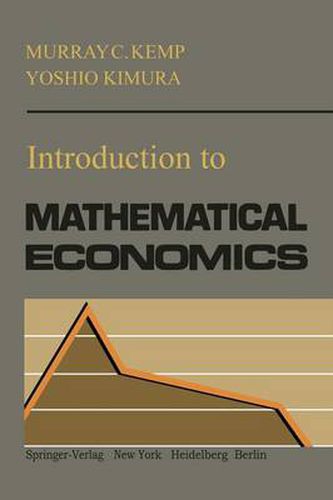Readings Newsletter
Become a Readings Member to make your shopping experience even easier.
Sign in or sign up for free!
You’re not far away from qualifying for FREE standard shipping within Australia
You’ve qualified for FREE standard shipping within Australia
The cart is loading…






This title is printed to order. This book may have been self-published. If so, we cannot guarantee the quality of the content. In the main most books will have gone through the editing process however some may not. We therefore suggest that you be aware of this before ordering this book. If in doubt check either the author or publisher’s details as we are unable to accept any returns unless they are faulty. Please contact us if you have any questions.
Our objectives may be briefly stated. They are two. First, we have sought to provide a compact and digestible exposition of some sub-branches of mathematics which are of interest to economists but which are underplayed in mathematical texts and dispersed in the journal literature. Second, we have sought to demonstrate the usefulness of the mathematics by providing a systematic account of modern neoclassical economics, that is, of those parts of economics from which jointness in production has been excluded. The book is introductory not in the sense that it can be read by any high-school graduate but in the sense that it provides some of the mathematics needed to appreciate modern general-equilibrium economic theory. It is aimed primarily at first-year graduate students and final-year honors students in economics who have studied mathematics at the university level for two years and who, in particular, have mastered a full-year course in analysis and calculus. The book is the outcome of a long correspondence punctuated by periodic visits by Kimura to the University of New South Wales. Without those visits we would never have finished. They were made possible by generous grants from the Leverhulme Foundation, Nagoya City University, and the University of New South Wales. Equally indispensible were the expert advice and generous encouragement of our friends Martin Beckmann, Takashi Negishi, Ryuzo Sato, and Yasuo Uekawa.
$9.00 standard shipping within Australia
FREE standard shipping within Australia for orders over $100.00
Express & International shipping calculated at checkout
This title is printed to order. This book may have been self-published. If so, we cannot guarantee the quality of the content. In the main most books will have gone through the editing process however some may not. We therefore suggest that you be aware of this before ordering this book. If in doubt check either the author or publisher’s details as we are unable to accept any returns unless they are faulty. Please contact us if you have any questions.
Our objectives may be briefly stated. They are two. First, we have sought to provide a compact and digestible exposition of some sub-branches of mathematics which are of interest to economists but which are underplayed in mathematical texts and dispersed in the journal literature. Second, we have sought to demonstrate the usefulness of the mathematics by providing a systematic account of modern neoclassical economics, that is, of those parts of economics from which jointness in production has been excluded. The book is introductory not in the sense that it can be read by any high-school graduate but in the sense that it provides some of the mathematics needed to appreciate modern general-equilibrium economic theory. It is aimed primarily at first-year graduate students and final-year honors students in economics who have studied mathematics at the university level for two years and who, in particular, have mastered a full-year course in analysis and calculus. The book is the outcome of a long correspondence punctuated by periodic visits by Kimura to the University of New South Wales. Without those visits we would never have finished. They were made possible by generous grants from the Leverhulme Foundation, Nagoya City University, and the University of New South Wales. Equally indispensible were the expert advice and generous encouragement of our friends Martin Beckmann, Takashi Negishi, Ryuzo Sato, and Yasuo Uekawa.